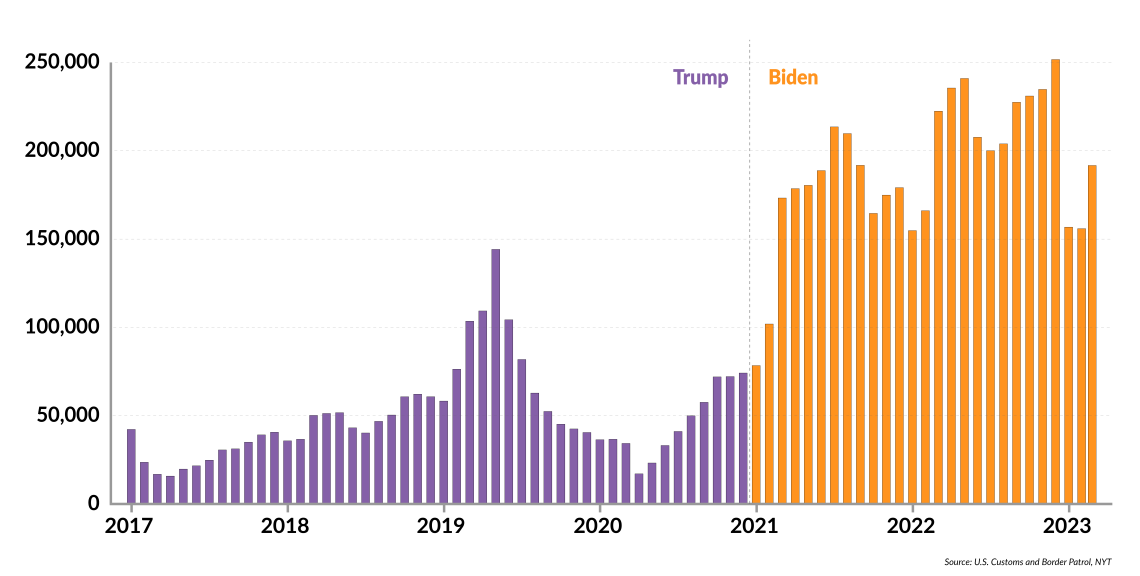Looming confrontation over border policy in the U.S.
Democrats and Republicans will not cut a compromise on immigration and border policy. The parties have adopted radically divergent stands on the issue.

In a nutshell
- Washington has begun treating immigration as a hot partisan issue
- The Republican and Democratic policy approaches are divergent
- Pragmatic solutions are not in the cards
The downside of the United States’ current immigration and border policies is hardly debatable. The country has suffered an increasing inflow of irregular immigrants, a rise in transnational criminal activity, a destabilizing impact on the Latin American region and a growing humanitarian crisis – all of these making it a front-burner issue in U.S. national politics. The likelihood that the administration of President Joe Biden could ameliorate the problem before the 2024 elections is negligible.
Origins of the crisis
Former U.S. President Donald Trump (2017-2021) made border security and immigration enforcement a signature policy, instituting several measures that included expanding physical barriers on the southern border (“the wall”) and creating a “remain in Mexico” rule requiring asylum applicants to remain outside the country rather than being paroled into the U.S. while their claims were reviewed.
During the 2020 presidential race, the Democratic candidate Joe Biden lambasted the incumbent’s measures as extreme and inhumane, vowing to reverse them if elected, but, in fact, the border and immigration issues played a marginal role in the campaign. Still, President Biden immediately upended Mr. Trump’s approach after taking office.
The rationale for this policy pivot is a matter of some controversy. Before the 9/11 terrorist attack (2001), immigration was a “third rail” issue (so charged that untouchable) in American politics, and neither party preferred to take decisive stands. The last significant Congressional action on immigration and border security occurred in 1986. In 2006, the Secure Fence Act, which called for ensuring operational control of the border against criminal cartel activity and illegal immigration, passed with broad bipartisan support.
With Mr. Biden at the helm, the term ‘irregular’ is preferred to ‘illegal’ immigration.
Immigration and border security became an increasingly partisan topic during President Barack Obama’s two terms in office (2009-2017). The president’s Democratic Party never embraced abrogating border and immigration security, but the two political blocks moved to pick sides on several politically loaded issues to better differentiate their visions for the country’s future.
During Mr. Trump’s presidency, leading voices in the Democratic Party became more candidly sympathetic to open border policies. For example, the number of Democratic-controlled counties, cities and states declaring themselves “sanctuaries” and refusing to cooperate with the federal government in enforcing immigration laws increased dramatically.
Facts & figures
Apprehensions of migrants at the U.S. southern border, monthly

The current administration has implemented the most radical departure in decades from the established U.S. border and immigration policies. With Mr. Biden at the helm, the term “irregular” is preferred to “illegal” immigration, “paroling” immigrants into the U.S. has been liberalized and cooperating with Latin American nations on the “root causes” and “push factors” driving migration has been intensified. The purported goal is to achieve a more humane and less disruptive process and rectify the abuses of the Trump era in the absence of consensus for updating immigration laws in a divided Congress.
A less generous Republican explanation for the administration’s policies is that President Biden’s actions may be rooted in a political agenda to accommodate demands for open borders. Some see it as part of a secret plan to engineer a massive political shift in the U.S. by letting in future Hispanic voters expected to overwhelmingly support the Democratic Party.
Some of the conservatists’ suspicions go even further, alleging that the administration works toward establishing the global right to migrate. Such a “right” would diminish the capacity of individual nations to set immigration policies and increasingly make governments responsible for providing a social safety net for persons regardless of their state of origin.
Read more on migration
The worrying faults of the UN migration compact
European migration as a political tool
The most extreme partisan view alleges that the administration’s border policies are rooted in cultural Marxism and meant to open the way to a broader anti-statist revolution.
Actions and their consequences
There is no question that none of the palliative outcomes promised by the Biden administration since taking power from Mr. Trump have materialized. The number of illegal border crossings has soared to millions, establishing new historic levels of illegal immigration. Criminal cartel activity has skyrocketed, as have the numbers of victims of human and sexual trafficking. The statistics of crimes against immigrants, from rape and robbery to murders, are also up. Finally, the burden of hosting immigrants across the nation has been crushing for many communities.
Evidence shows that the Biden administration’s policy has adversely affected Latin America, further destabilizing rather than strengthening the states, the rule of law, public safety and economic conditions. According to regional security expert Joseph Humire, as border enforcement capacity collapses throughout the region, transnational criminal organizations gain more territorial control along borders. That leads to more cross-border killings, kidnappings, human trafficking or smuggling. The cartels – Mexican, Colombian, Central American and Venezuelan – expand their power and influence.
And looking more broadly, Mr. Humire believes that open borders in Latin America have weakened the national sovereignty of the region’s 21 countries and territories and allowed transnational networks, including those backed by China, Russia and Iran, to subvert Latin American democracies. He told this author that all of this “is manifesting itself on our southern border.”
The fight is about politics and vision for the country, not immigration.
Finally, illegal immigration keeps on increasing. The pool of countries from which immigrants are coming expands as well, along with the concern that unlawful immigration is creating additional national security threats. Only last April, Border Patrol officials detained 16 individuals present on the FBI terror watch list.
Policy and response
The Biden administration’s initial response was to claim that the surge in illegal migration was “seasonal” and the negative consequences resulted from the need to address the problems created by the Trump administration. As unlawful migration continued to rise, the administration ramped up the practice of “paroling” individuals into the U.S. at ports of entry, and now it argues that illegal immigration has dropped. The pretense is that there is no border security crisis.
Even though immigration and border security were significant issues in the midterm elections, the president’s party did not see dramatic reversals in Congress. As a result, the administration has done little to reverse or adjust the failed approach, even though some Congress members called for the impeachment of the Homeland Security secretary responsible for the situation along the borders. In addition, the House of Representatives recently passed a bill calling for stricter enforcement, but the measure has no chance of passing in the Democratic-controlled Senate.
What to expect next?
The fight is about politics and vision for the country, not immigration. The most probable scenario is that the administration will not change its policies before the national elections, feeling confident enough to defend them during the campaign. The opposition candidate will almost assuredly run on a platform of immediately imposing strict enforcement of border and immigration rules.
There is almost no possibility of bipartisan legislation in Congress. Both parties will strive to establish a majority to enable them to define the national legislative agenda. At the state level, legislatures are adopting variable policies based on whether Republicans or Democrats control them.
Absent some “black swan” event such as a terrorist attack or economic upheaval, likely U.S. immigration policy will be set not by compromise or the impact on the country but by which party establishes political dominance in the U.S. in the coming years.









